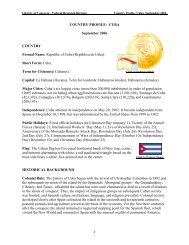1 - American Memory
1 - American Memory
1 - American Memory
You also want an ePaper? Increase the reach of your titles
YUMPU automatically turns print PDFs into web optimized ePapers that Google loves.
180<br />
Nell W. Chamberlain sums It up: "Congress Is hardly an appropriate agency to<br />
deal with an ad hoc dispute . . . Unless there is some issue which so stirs up emo-<br />
tions as to prompt a solid response, such as violence on the picket line or flagrant<br />
disregard of puljllc welfare, congressional debate over the merits of the dispute<br />
will simply reproduce the partisan arguments of the bargaining table without<br />
even the relevant knowledge which the negotiators possessed. If emotions are<br />
suflSdently inflamed to lead to quick decision, we can toe sure the decision will for<br />
that reason be uninformed.<br />
"Moreover, when one considers that typically collective bargaining involves not<br />
just one or two but a dozen or two of separate and often complex issues, the possi-<br />
bilities for protracted debate and inexpert conclusion are many times multiplied,<br />
r agree wholeheartedly with Professor Richard Lester when he says, 'It is diffi-<br />
cult to think of a more inappropriate body to which to submit a labor dispute for<br />
final adjudication than the Congress.' " '<br />
We feel that the Congress would be perfectly content to leave the thankles."*<br />
problem of settling emergency disputes to someone else<br />
Our conclusion is that the Taft-Hartley Act and the Railway Labor Act are<br />
badly In need of overhaul, that the type of legislation that should be enacted to<br />
replace them is fairly well agreed upon in general outline, and that the Congress<br />
should act. On the other hand. President Nixon seems to have backed away from<br />
his earlier proposals along this line (S. 560) and Labor Secretary Peter Brennan<br />
has said that as long as he remains In the administration, he will advocate only<br />
voluntary means to settle all labor disputes including strikes in the trucking,<br />
maritime, longshore, airline, and rail industries. This attitude of the administra-<br />
tion certainly does not preclude the Congress from acting, but it clearly make*<br />
action somewhat more difficult.<br />
Also, our experience in Hawaii has been that when we have been crippled by<br />
a destructive transportation strike, it is extremely hard to get the ear of many<br />
people in Washington.<br />
Realistically, then we move to our final proposal, which is the recommenda-<br />
tion of this report.<br />
PROPOSAL C. PABTIAl. OPERATION FOK HAWAU<br />
One of the three options provided for in S. 560 was 'the partial operation oj)-<br />
tion. This proposal (in one form or another) was also Included in the Staggers-<br />
Williams bill and the Javits bill and is currently in both the Fong (S. 640) and<br />
the Inouye (S. 231) bills. We propose that this portion of the suggested legis-<br />
lation be enacted to apply specifically to Hawaii in the event of longshore, marl-<br />
time, or trunk carrier airline strikes or threats of strikes.<br />
Under this option as contained in S. 560, the President would appoint an im-<br />
partial, three-member board to determine the feasibility of partial operations<br />
In essential portions of a struck industry. The board would hold public hear-<br />
ings and order the extent and conditions of partial operation. The parties<br />
would be subject to the board's order for a period determined by the board, of<br />
not more than 180 days.<br />
The partial operations law that we are proposing here would be more explicit<br />
than the terms of S. 560. It would provide that in the event of a longshore<br />
strike, or maritime strike, or a national strike of airline trunk carriers affect-<br />
ing service to Hawaii, the President would ^rder service to Hawaii maintained<br />
at its normal prestrlke level that a three-man impartial presidential board<br />
would administer this order by determining—in the light of all the Interests<br />
involved—-which carriers would operate at what volume to maintain the pre-<br />
strlke level of service to Hawaii, and what the terms and conditions of employ-<br />
ment would be, and what the returns to the operators would be.<br />
Partial operation involves only a minimum of government intervention. If<br />
confined to a small segment of the industry. It leaves the economic pressures of<br />
the shutdown in the major portion of the industry to serve as an incentive to<br />
settlement. It in no way interferes with the process of collective bargaining. It<br />
is fair to both parties to the disimte in that the bill would require that no order<br />
of the board shall place a greater economic burden on any party than that which<br />
a total cessation of operations would impose. And finally as applied to Hawaii,<br />
« N. W. Cbambcrlnin. "The Problem of Strikes." In ProreeOingn of Neir York T'nivrrtttu<br />
Thirteenth Annual Conference on Labor, Matthew Bender, New York, 1960. pp. 444-40.



![Albert Einstein Papers [finding aid]. Library of Congress. [PDF ...](https://img.yumpu.com/21604228/1/190x245/albert-einstein-papers-finding-aid-library-of-congress-pdf-.jpg?quality=85)





![American Colony in Jerusalem Collection [finding aid]. Library of ...](https://img.yumpu.com/17941275/1/190x245/american-colony-in-jerusalem-collection-finding-aid-library-of-.jpg?quality=85)



![Piccard Family Papers [finding aid]. - American Memory - Library of ...](https://img.yumpu.com/17941234/1/190x245/piccard-family-papers-finding-aid-american-memory-library-of-.jpg?quality=85)


